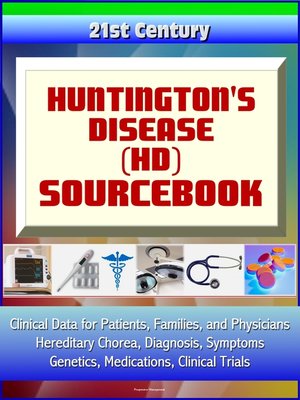21st Century Huntington's Disease (HD) Sourcebook
ebook ∣ Clinical Data for Patients, Families, and Physicians--Hereditary Chorea, Diagnosis, Symptoms, Genetics, Medications, Clinical Trials
By Progressive Management

Sign up to save your library
With an OverDrive account, you can save your favorite libraries for at-a-glance information about availability. Find out more about OverDrive accounts.
Find this title in Libby, the library reading app by OverDrive.



Search for a digital library with this title
Title found at these libraries:
| Loading... |
This comprehensive ebook provides authoritative information and practical advice from the nation's health experts about Huntington's Disease, also known as hereditary chorea. Starting with the basics, and advancing to detailed patient-oriented and physician-quality information, the 21st Century Sourcebook series gives empowered patients, families, caregivers, nurses, and physicians the information they need to understand this disease. There is coverage of symptoms, diagnosis, medical testing, clinical research, drugs and potential treatments.HD results from genetically programmed degeneration of nerve cells, called neurons, in certain areas of the brain. This degeneration causes uncontrolled movements, loss of intellectual faculties, and emotional disturbance. Specifically affected are cells of the basal ganglia, structures deep within the brain that have many important functions, including coordinating movement. Within the basal ganglia, HD especially targets neurons of the striatum, particularly those in the caudate nuclei and the pallidum. Also affected is the brain's outer surface, or cortex, which controls thought, perception, and memory. HD is found in every country of the world. It is a familial disease, passed from parent to child through a mutation or misspelling in the normal gene. The rate of disease progression and the age at onset vary from person to person. Adult-onset HD, with its disabling, uncontrolled movements, most often begins in middle age. There are, however, other variations of HD distinguished not just by age at onset but by a distinct array of symptoms. For example, some persons develop the disease as adults, but without chorea. They may appear rigid and move very little, or not at all, a condition called akinesia.Contents: Chapter 1: National Institute of Neurological Disorders and Stroke (NINDS) Information * Chapter 2: National Human Genome Research Institute (NHGRI) Information * Chapter 3: Centers for Disease Control and Prevention (CDC) Information * Chapter 4: FDA Information * Chapter 5: National Institutes of Health Research Portfolio Online Reporting Tools (RePORT) Studies * Chapter 6: Clinical Trials * SECTION B: GUIDE TO LEADING MEDICAL WEBSITES; INTERNET RESOURCES FOR MEDICAL AND HEALTH INFORMATIONThis edition includes our exclusive Guide to Leading Medical Websites with updated links to 81 of the best sites for medical information, which let you quickly check for updates from the government and the best commercial portals, news sites, reference/textbook/non-commercial portals, and health organizations.






